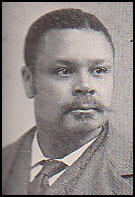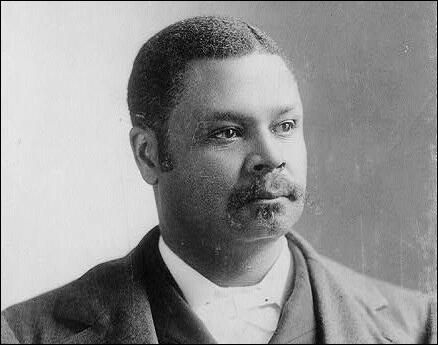George Henry White

George Henry White was born a slave in Rosindale, North Carolina, on 18th December, 1852. After working as a farm labourer he studied at Howard University (1873-1877). This was followed by a period as a school teacher and as a lawyer in New Bern.
A member of the Republican Party, White was elected to the House of Representatives in 1880. He campaigned for increased spending on African American education. White helped to establish four new schools and for a while served as principal of the school in New Bern.
In 1885 White was elected to the state Senate where he served on the committees for the insane asylum, insurance and judiciary. He also continued to work as a lawyer in New Bern and Taboro.
White was elected to Congress in 1896. He was the last former slave to serve in Congress and by 1898 was the only African American in the House of Representatives. White campaigned against racial discrimination and urged the enforcement of the second section of the Fourteenth Amendment that reduced the representation in the House of Representatives of those states which denied African Americans the vote.
In one speech in 1900 he argued: "It is easy for these gentlemen (white politicians) to taunt us with our inferiority, at the same time not mentioning the cause of this inferiority. It is rather hard to be accused of shiftlessness and idleness when the accuser closes the avenue of labour and industrial pursuits to us. It is hardly fair to accuse us of ignorance when it was made a crime under the former order of things to learn enough about letters to even read the Word of God."

In January, 1901, White proposed a bill that would make lynching of American citizens a federal crime. He argued that any person participating actively in or acting as an accessory in a lynching should be convicted of treason. White pointed out that lynching was being used by white mobs in the Deep South to terrorize African Americans. He illustrated this by showing that of the 109 people lynched in 1899, 87 were African Americans. Despite White's passionate plea, the bill was easily defeated.
White was aware that his outspoken comments on civil rights would result in him losing his next election. In his last speech in Congress on 29th January, 1901, White predicted: "This is perhaps the Negroes' temporary farewell to the American Congress; but let me say, Phoenix-like he will rise up some day and come again. These parting words are in behalf of an outraged, heart-broken bruised and bleeding, but God-fearing people, faithful, industrious, loyal, rising people - full of potential force." White's forecast was correct and it was not until 1928 that another African American, Oscar DePriest, was elected to Congress.
In 1905 White moved to Philadelphia where he successfully practiced law and established the People's Saving Bank in Lombard Street. This bank was able to help African Americans to purchase homes and start businesses. As well as helping to establish Whitesboro, a community for migrating African Americans from the Deep South, White was active in the National Association for the Advancement of Coloured People (NAACP). George Henry White died in 1918.
Primary Sources
(1) George Henry White, speech in Congress (23rd February, 1900)
It is easy for these gentlemen (white politicians) to taunt us with our inferiority, at the same time not mentioning the cause of this inferiority. It is rather hard to be accused of shiftlessness and idleness when the accuser closes the avenue of labour and industrial pursuits to us. It is hardly fair to accuse us of ignorance when it was made a crime under the former order of things to learn enough about letters to even read the Word of God.
(2) George Henry White, speech in Congress (29th January, 1901)
This is perhaps the Negroes' temporary farewell to the American Congress; but let me say, Phoenix-like he will rise up some day and come again. These parting words are in behalf of an outraged, heart-broken bruised and bleeding, but God-fearing people, faithful, industrious, loyal, rising people - full of potential force.

